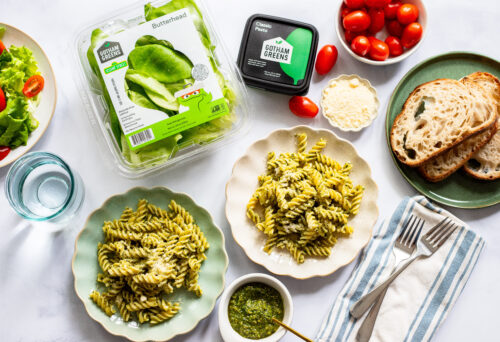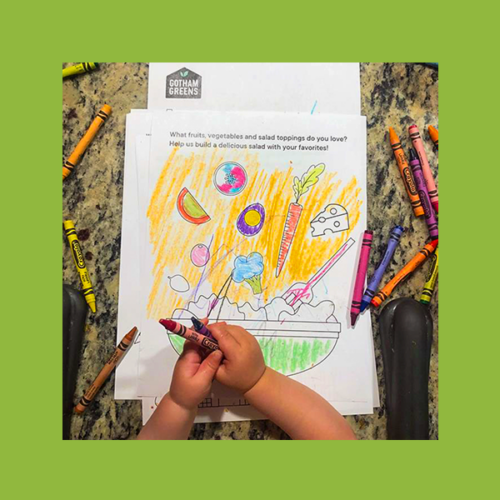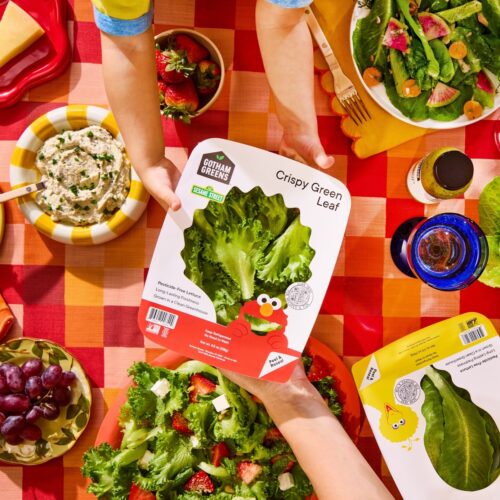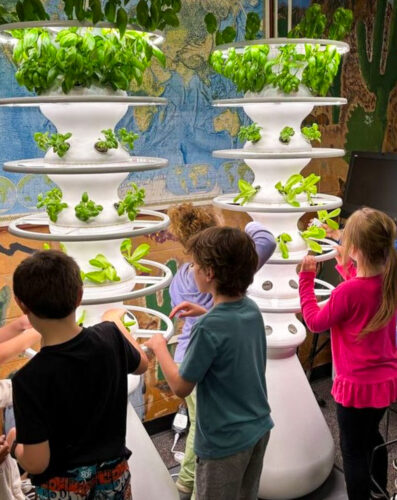 At Gotham Greens, we’re passionate about growing plants, but we’re just as passionate about cultivating community. That’s why we partner with a variety of schools and non-profits to support STEM education. In 2023, we donated more than 12,000 plant seedlings to local schools. Let’s meet our friends at the Richmond School based in Providence, R.I.!
At Gotham Greens, we’re passionate about growing plants, but we’re just as passionate about cultivating community. That’s why we partner with a variety of schools and non-profits to support STEM education. In 2023, we donated more than 12,000 plant seedlings to local schools. Let’s meet our friends at the Richmond School based in Providence, R.I.!
We caught up with elementary physical and health educator Kim Daigle, who told us the incredible ways our seedlings are being used in the classroom.
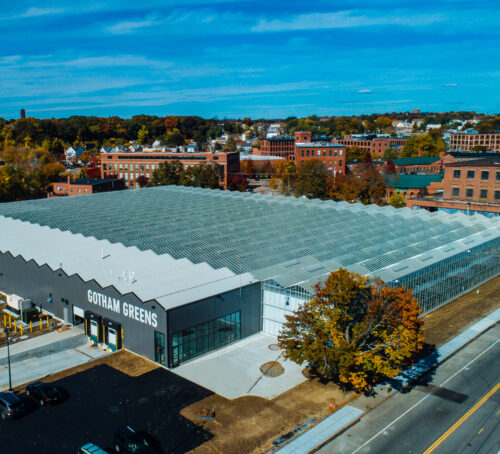 How did you first get connected with Gotham Greens?
How did you first get connected with Gotham Greens?
We’ve always known Gotham Greens for having a greenhouse right here in Providence. At the Richmond School, we’re proud to have on-site gardens and three 36-pod Lettuce Grow hydroponic units in our library.
Several of the teachers at Richmond School have taken the University of Rhode Island (URI) Master Gardener course in order to be better equipped to grow in our gardens and greenhouse (and to be as successful as possible!). During this URI Master Gardener class, they spoke about hydroponics and how Gotham Greens supported schools with their projects through the donation of seedlings. I could not wait to make this connection! Gotham Greens has been an outstanding ally and has supported us since day one.
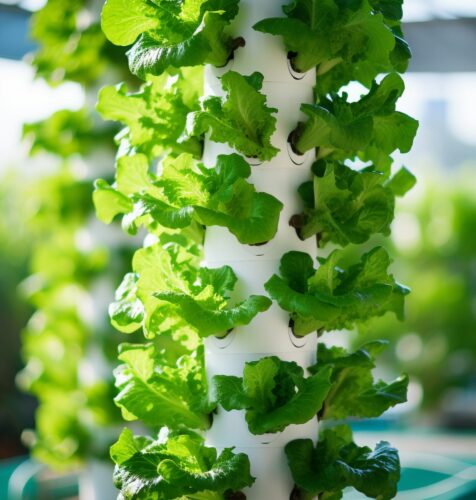 How do you grow greens in the classroom and how are the students involved?
How do you grow greens in the classroom and how are the students involved?
The three hydroponic units we presently have are in the library for all Richmond students to see, enjoy and learn from daily.
“Our students are involved from the very beginning — they are the ones to ‘pop’ the seedlings from Gotham Greens into the grow pod holders in the hydroponic units. They absolutely love this process and thoroughly enjoy being the ones to start the seedlings on their journey.”
The students are able to observe the seedlings as they continue to grow from small seedlings into full size plants. They also can make real-life connections with their GemsNET science kits. Students grow plants from seed in all grade levels. Grade 3 specifically makes a deep connection because one of their science units has [students] growing beans hydroponically. As the plants continue growing, observations are made. Once it’s time to harvest the plants, we coordinate a time with a class, and they come down to harvest. All students get to put on a pair of gloves and then they have a specific “job” to do.
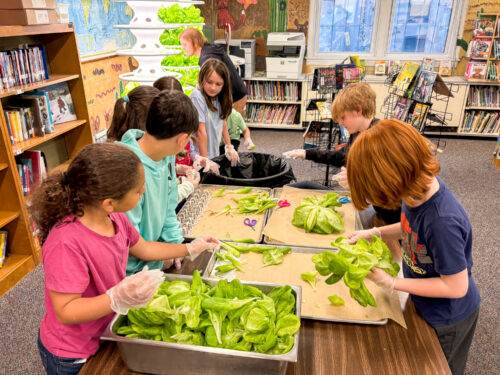 It’s an assembly line process, where the plants slowly and gently move through each step of harvesting. The process eventually leads to placing plants in a large kitchen bin to later be delivered to the kitchen for washing and prep to be used either in the school lunch as a main ingredient or as part of a monthly food tasting. Harvesting the produce that comes from our units is a very coveted job and everyone wants to do it!
It’s an assembly line process, where the plants slowly and gently move through each step of harvesting. The process eventually leads to placing plants in a large kitchen bin to later be delivered to the kitchen for washing and prep to be used either in the school lunch as a main ingredient or as part of a monthly food tasting. Harvesting the produce that comes from our units is a very coveted job and everyone wants to do it!
Tell us a few of the ways that the students have enjoyed a meal with the harvested greens.
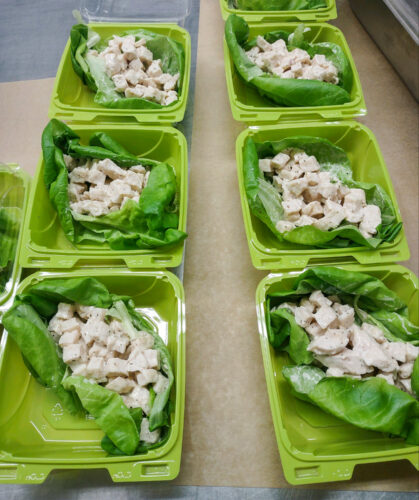
In the past, we have used the lettuce grown in the hydroponic units for items such as chef salads, Caesar salad, pesto pasta, and most recently, we hosted a chicken salad lettuce wrap Tuesday! We had our student council health and wellness leader promote the lunch choice on the announcements daily and hype it up. I was so worried that all our hard work was for nothing when I saw the lunch choices we were up against! But our chicken salad lettuce wrap came in as the first choice among students, so it was a success!
Any greens that are not used in the school lunch program is donated to our local food pantry, RICAN. Many of our heads of lettuce that come from the seedlings donated from Gotham Greens grow to weigh approximately ONE POUND each! The kids absolutely love harvesting these large heads of lettuce and also love harvesting basil – both fill the hallways with fragrant scents that can be smelled on various floors!
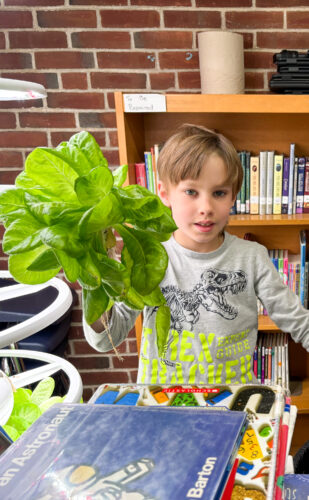 How does growing fresh produce in the classroom impact the children?
How does growing fresh produce in the classroom impact the children?
Growing fresh produce in the classroom allows all students to see that you can produce healthy foods anywhere; even in the school library! Allowing students to make connections between the food they help to grow and harvest, their science experiments and learning how what we grow connects to health units (such as nutrition) is so valuable. Being able to experience something firsthand makes it much easier to comprehend when they encounter the same topic elsewhere.
Also, some students have never grown plants at home. Students love eating what they grow and learning how what they’ve harvested has turned into “something else” that tastes so good!
“Growing fresh produce in the classroom allows all students to see that you can produce healthy foods anywhere; even in the school library!”
What long-lasting effects do you hope this experience will bring to students?
I’m hoping that introducing the process of growing fresh produce in the classroom will encourage our students to go home and have conversations around food with their families! Food is the basis of good health. I’m positive that this experience will also motivate many students to try new foods they may not have wanted to try previously as they’re learning that foods they didn’t think would taste good actually do.
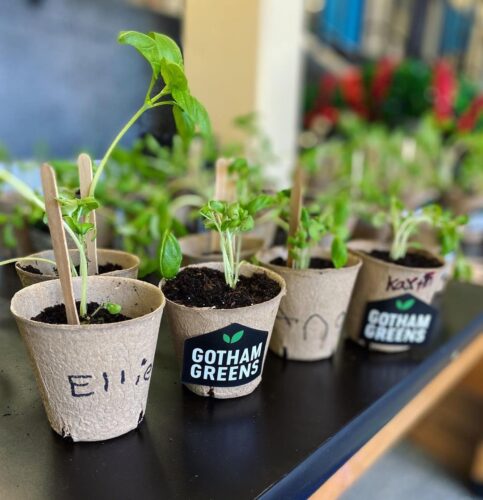
I’m also hoping it encourages students to get involved in their local FFA or agricultural group and prompt them to ask questions that they are curious about… to encourage them to be more aware of their surroundings and their environment, to be more thoughtful of their carbon footprint, and to advocate for ways to increase food production with the least amount of energy and waste.
Thank you, Kim, for championing this amazing program at your school!
I cannot thank Gotham Greens enough for sharing with our students the opportunity to see fresh produce growing in their school! Many of our students do not have the ability to have a garden at home; however, being able to be a part of the process of planting, growing and harvesting at school levels the playing field between all students. Now everyone can participate and make real life connections between what they are able to experience first-hand and what they learn throughout different content areas! All students want to participate in this process because they truly feel so accomplished.
